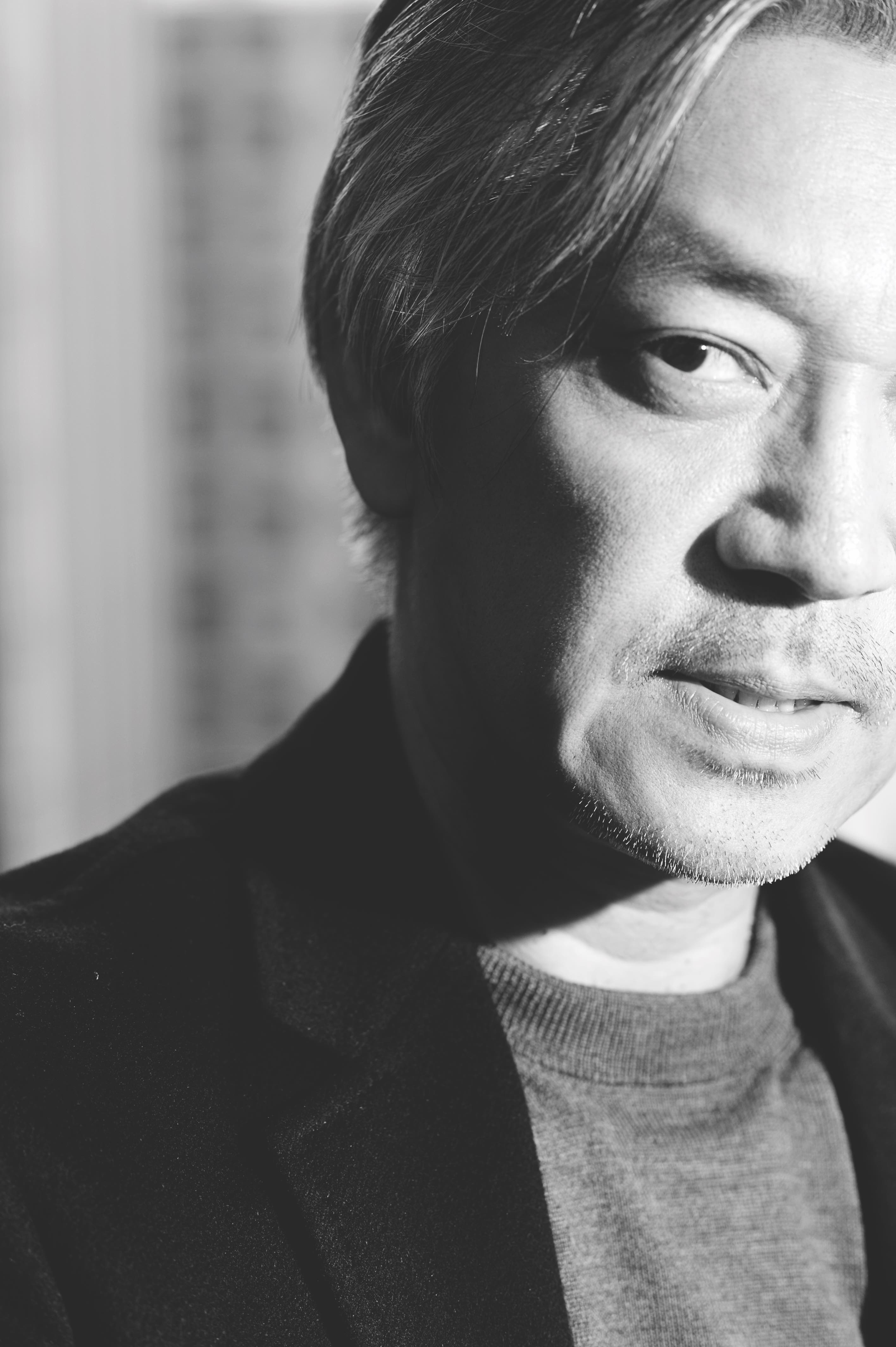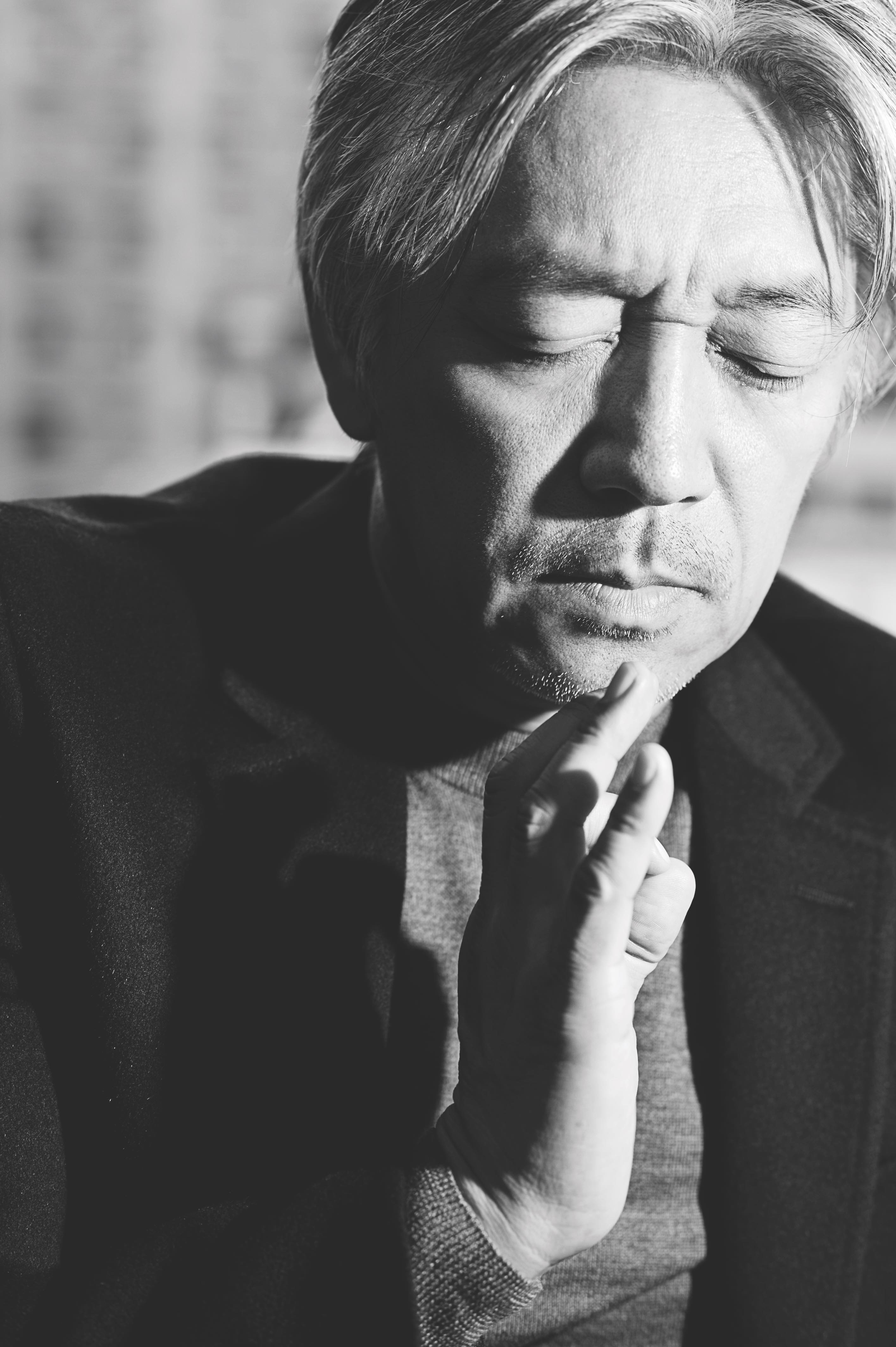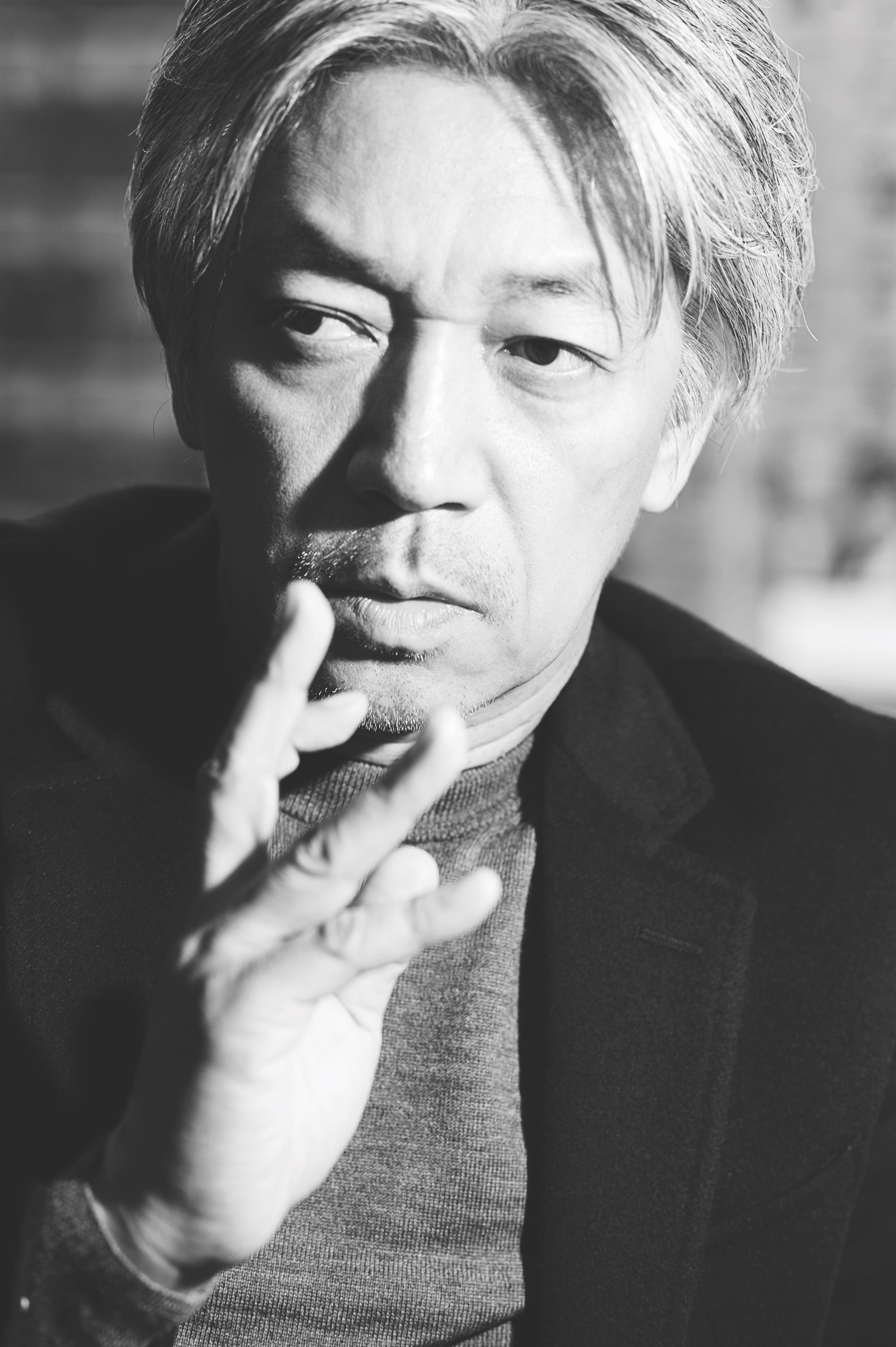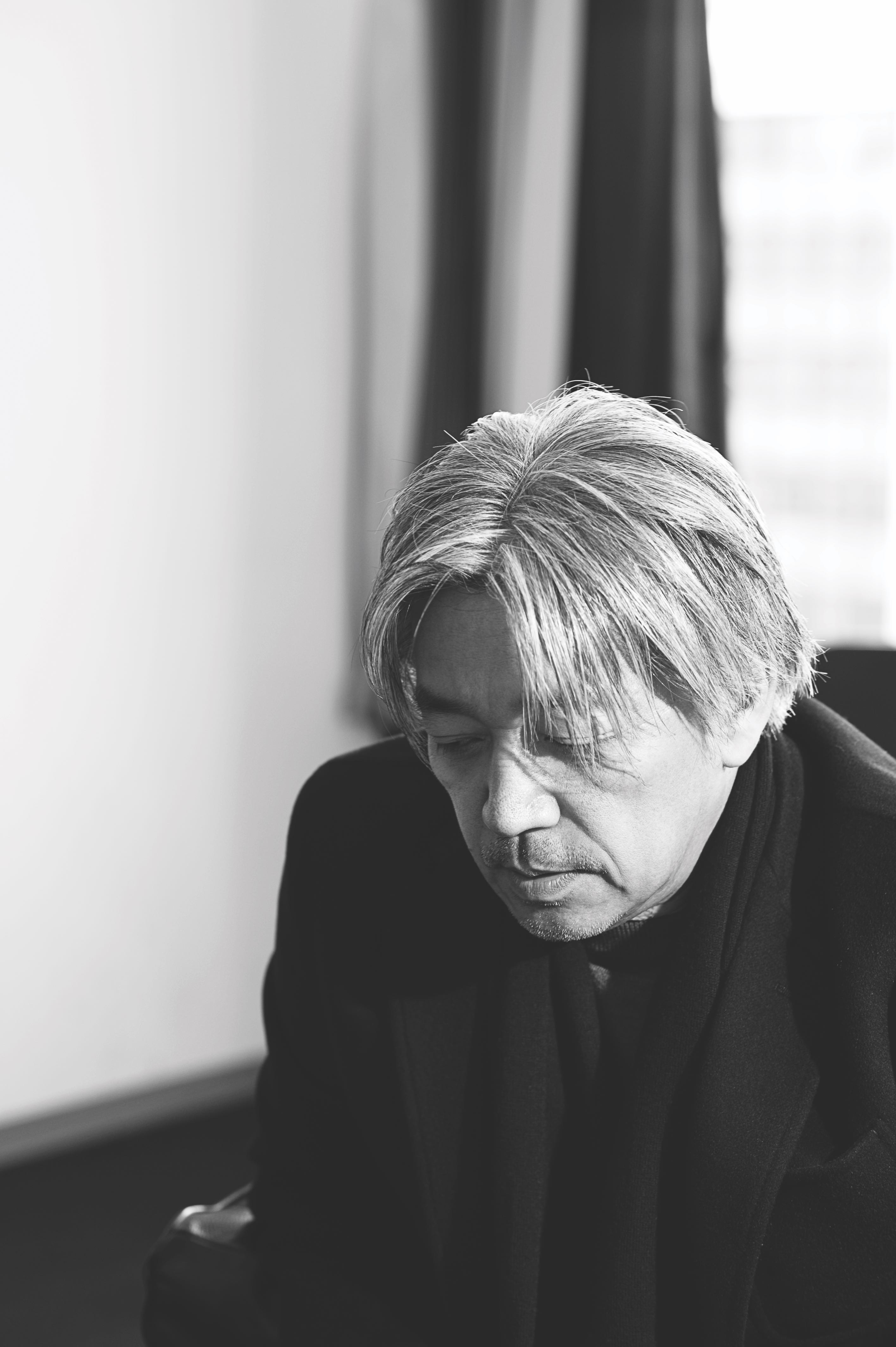Ryuichi Sakamoto cited the19th Century French composer Claude Debussy, Bach and The Beatles as his biggest influences, yet his musical style derived from a deep interest in multicultural forces. His compositions have combined elements from the musical traditions of Asia and other cultures with everything from European formalism to Western electronica. Sakamoto has touched millions of hearts through his breakthrough soundtracks for ‘Merry Christmas, Mr Lawrence‘ and ‘The Last Emperor‘ and a great deal more before and after, making him Japan’s most prolific musical export.
Ryuichi Sakamoto arrives exactly on time for his interview, as sharp as the compositions he has become known for. From the outset, he is modest, humble and has a somewhat unexpected, yet sharp sense of humour. Casually elegant, the good looks are ever apparent, the cheekbones and overall facial structure are still as chiselled, and his grey hair falls loosely over his captivating eyes.
Sakamoto was born in Japan in 1952 and began piano training at the age of three. “I started to be interested in music when I was in kindergarten, and practised piano all the way through elementary school. By the 5th grade, I was the only one amongst my peers to continue,” he recalls. “Then my piano teacher forcefully took me to the person who was responsible for teaching composing, but both my parents and I said ‘no thank you’, but the teachers were very persistent and I eventually ended up at Tokyo University of The Arts, specialising in music. It has been a part of me throughout my life.”

Sakamoto formally enrolled as a university student in 1971, where he came into contact with synthesizers, which were then expensive and rare, for the first time. Having earned a B.A. in Composition and later a Master's Degree with a focus in electronic and ethnic music, he began work as a composer, arranger, and studio musician in 1977 with some of Japan's most popular rock, jazz, and classical artists. Within a few years, he became a noted producer, arranger, and keyboardist. “But it wasn’t until I was asked to join Yellow Magic Orchestra (YMO) that all of a sudden I became famous. At 28 years-old I finally had to admit that I was a musician!” laughs Sakamoto.
It was fellow musicians Haruomi Hosano and Yukihiro Takahashi who asked Sakamoto to become the third member of what became the hugely successful Yellow Magic Orchestra, an avant-garde trio whose sound drew heavily from progressive European music of the 1970s, but also incorporated a distinctly Japanese sonic touch. "They were the Great Yellow Hope, the group that would crack the Anglo curtain and do for Japanese musicians what the Beatles did for the British," Bob Doerschuk wrote in Keyboard magazine.
YMO not only experienced the dizzy heights of success in Japan, but also found an unprecedented audience internationally. Their second album, ‘Solid State Survivor’, released in 1979, sold well over a million copies, which led to the first of many world tours. In the course of his travels, Sakamoto became acquainted firsthand with the cultures of much of the international music that had long fascinated him. “Between the ages of 11 and 18, I had to learn about Western music - that bridged a period of 300 years - and there was nothing more to study after that. So in the 70s, when Europe looked to Africa and Asia for ethnic influences, I was also very interested in that. Electronic music was very new at that time.”

Between 1978 and 1984, YMO released 13 albums, as well as an additional 13 albums of other material and remixes over the next 12 years. Though they disbanded in 1983, with members wishing to move on to other projects, YMO remained popular even in the late 1990s, with several Internet websites devoted to the group. Sakamoto's contributions to the group's prolific output demonstrated his interest in such diverse sources as jazz, classical, Jamaican dub, Latin bossa nova, and Indonesian gamelan as well as his interest in pioneering electronic equipment.
1983 saw a new breakthrough for the already acclaimed Sakamoto, as he seamlessly moved into the world of motion pictures, composing the soundtrack for the seminal movie ‘Merry Christmas, Mr. Lawrence’, as well as co-starring opposite David Bowie in the World War II-set drama. “Merry Christmas, Mr. Lawrence wasn’t only my first film score, it was also my first acting experience,” he recounts. “The director approached me personally and asked me to act first, but I said, ‘can I just make the music instead?’ That movie changed my life. The film was actually shot first, then I composed the soundtrack having seen the rough edit. I almost fell off my chair because my acting was so bad and thereafter all the emotion went into the music! But at the end of the day, I enjoyed it all.”
Four years later, a chance meeting at the Cannes Film Festival with the prolific director Bernardo Bertolucci led to Sakamoto being invited to compose for the epic and memorable ‘The Last Emperor’, a haunting soundtrack that won an Oscar, a Grammy, a Golden Globe, and the New York, Los Angeles, and British Film Critics Association awards for Best Original Score. Bertolucci and Sakamoto subsequently collaborated on two further films together – ‘The Sheltering Sky’ and ‘Little Buddha’. “Our relationship evolved with each film. For ‘The Last Emperor’, he [Bertolucci] only used half of what I had created, but by the third film he used everything that I had composed!” Pursuant to his work for Bertolucci, Sakamoto went on to work with Volker Schlondorff on ‘The Handmaid's Tale’, Oliver Stone for the US television series ‘Wild Palms’, and Spanish director Pedro Almodovar on ‘High Heels’.
In addition to his work with YMO, the film scores, and extensive collaborative efforts with Western musicians, Sakamoto also enjoyed an impressive solo career, releasing more than 20 albums.


1992 saw Sakamoto reach another milestone in his already hugely successful career, when he was asked to compose part of the score for the Opening Ceremony of the 1992 Olympic Games. “I actually dislike sports events, so I initially declined the offer,” says Sakamoto with a wry smile when asked how this invitation came about. “The producer Pepo and two other members of his team did their best to convince me, and eventually I looked at some drawings for the event and thought it actually might be interesting. Pepo was a Catalonian producer and I grew to like him so I eventually agreed to do it for his sake. I visited Barcelona and gave some concerts and the process of writing became quite practical. I had to tell the story of the Mediterranean region - from Greece to Spain - in 30 minutes. I thought to myself, why ask an Asian to do this, to which Pepo responded, ‘why not?’”
After more than 35 years in the business and ever-changing musical styles, where does Sakamoto derive his inspiration from? As he composes his answer, he laughs quietly to himself. “If only I knew where it comes from, it might make my life a lot easier! I try everything - I take a bath, a walk, watch a movie...Looking back, I don’t remember how I came about making my music.” Pointing skywards, he adds, “It’s a gift from up there.”
There was a brief period however, when the musician/composer found himself completely unable to either play or write. “I was living in downtown New York when 9/11 happened. When I heard the noise I was terrified, and under those kinds of circumstances, no-one can write, listen or perform music. New York was dead, quiet...there was no music. After 72 hours, we knew that not many people had survived so we started to pray for the dead. I saw the core of what music is and I was too scared to think about composing. But eventually I had to go on, and little by little it had a healing effect. I am making a soundtrack for a documentary on the subject now. It was an incredibly moving experience, I have never felt that much fear in my life.”
2014 however dealt Sakamoto a major setback when he was diagnosed with throat cancer, from which he continues to recover, yet he continued to work, most notably on the haunting soundtrack for the highly successful ‘The Revenant’ with German electronic musician Alva Noto, which earned the pair a Grammy Award nomination.
In spite of these setbacks, fortunately for fans of Sakamoto and music lovers everywhere, although admitting to heavy fatigue as a result of his cancer treatment, the illustrious musician continued to pursue his greatest passion. 2017 saw the release of ‘Async’, Sakamoto’s first solo album in seven years. Heralded as one of last year’s electronic music highlights, 2018 brings ‘Async Remodels’, a set of remixes by the crème-de-la-creme of the avant-garde music world.
‘Async’ and its remixes are signature Sakamoto - intense, complex and musically visionary. “There are no limits to my style. I have new styles all the time. In front of me is a garden of music...English, French...Today I may walk in the Japanese garden, tomorrow somewhere else. That is me.”
Ryuichi Sakamoto passed away on March 28, 2023 in Tokyo.
